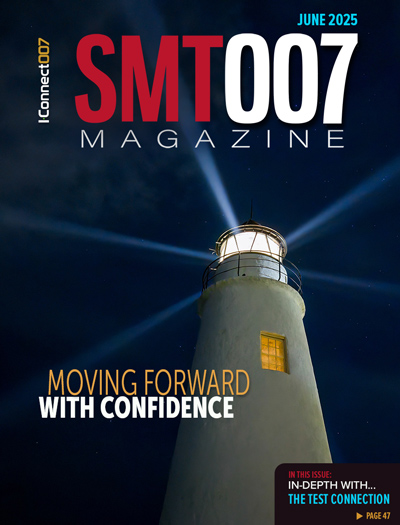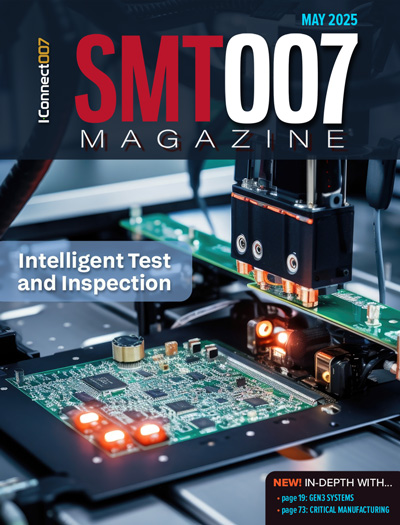-

- News
- Books
Featured Books
- smt007 Magazine
Latest Issues
Current Issue
What's Your Sweet Spot?
Are you in a niche that’s growing or shrinking? Is it time to reassess and refocus? We spotlight companies thriving by redefining or reinforcing their niche. What are their insights?

Moving Forward With Confidence
In this issue, we focus on sales and quoting, workforce training, new IPC leadership in the U.S. and Canada, the effects of tariffs, CFX standards, and much more—all designed to provide perspective as you move through the cloud bank of today's shifting economic market.

Intelligent Test and Inspection
Are you ready to explore the cutting-edge advancements shaping the electronics manufacturing industry? The May 2025 issue of SMT007 Magazine is packed with insights, innovations, and expert perspectives that you won’t want to miss.
- Articles
- Columns
- Links
- Media kit
||| MENU - smt007 Magazine
IPC Mexico Continues to Grow
July 20, 2022 | Barry Matties and Andy Shaughnessy, I-Connect007Estimated reading time: 14 minutes
IPC Mexico has been growing for the past few years, and it’s no wonder: Mexico has become a major hub in the world of PCB manufacturing, spurred in part by reshoring as companies pulled work back from China during the pandemic. As the country’s maquiladoras1 thrived, IPC began expanding the Mexican educational and training operations, and the group recently named Lorena Villanueva as director of IPC Mexico.
Andy Shaughnessy and Barry Matties recently spoke with Lorena and IPC Vice President of Education David Hernandez about IPC Mexico’s growth, as well as the office’s plans to provide PCB manufacturers the training resources they need to succeed.
Andy Shaughnessy: David, why don’t you give us an update on IPC Mexico?
David Hernandez: As you’re aware, Mexico is becoming increasingly important in the electronic supply chain, particularly for North America. There’s a series of different geopolitical factors that are driving this as well as business decisions but over the last five years, what we’ve really seen is a significant re-shoring of manufacturing—or near-shoring of manufacturing—to Mexico to service the United States. Even before the pandemic, as all this was happening, we at IPC wanted to put a greater focus on Mexico, and we started an initiative to better service the industry in Mexico and what we could do to help.
We started meeting with Mexican companies to see how we could contribute and help them succeed. Then the pandemic hit, and we tried to continue the efforts as best we could virtually, but we realized it was very difficult for us in the United States to service all the needs of Mexican organizations and the industry in Mexico with just the staff here.
We knew we needed to hire someone in Mexico who could really connect with their industry, take ownership, and grow the services we offer companies in Mexico. We were quickly connected with Lorena Villanueva, brought her on board, and she has exceeded all our expectations. We are so excited about everything that she has been doing in Mexico to help us. She brings energy, excitement, talent, and professionalism to the team.
This is the first step. We have more plans for IPC Mexico. Our starting point was bringing in Lorena as director of IPC Mexico, and we hope to grow our team, and the services and product lines that we provide the Mexican companies as well as the industry there.
Barry Matties: I’m curious, are you seeing a certain request from the companies there that may be different from other regions?
Hernandez: It’s a great question, Barry. While there are definitely commonalities in the global supply chain, each region has a particular set of needs that are inherently different from the others.
It has to do with the local workforce, the local supply chain, and local politics; those variations create a different dynamic. They may not need a completely different set of products or services that IPC offers, but maybe they need them in a way that is tailor-made to their needs. That’s why having someone like Lorena, who is interacting with the industry there daily, is so important.
You’re seeing a similar effort by IPC and IPC Europe. We opened our first European office recently and we’re expanding the staff there. We’re placing a greater emphasis in the area, making sure that we can service their individualized needs. It’s the difference between saying, “Here’s a solution that fits everyone,” and, “Let’s take the solutions that fit everyone to figure out what we can do to better serve you.”
Shaughnessy: That’s great. Lorena, tell us about your background. I see that you’re a Six Sigma black belt.
Lorena Villanueva: Yes, and thank you, David, for this introduction. I’m thrilled to be here with IPC. As you mentioned, I’m a Lean Six Sigma black belt, and I’ve been working in the commercial, sales, and business development world for quite some time now. Being able to use my experience plus the knowledge that I had of the region has helped us reinforce the attention that IPC had already put on Mexico and the Latin America regions, as well as give our clients the confidence that we will help them build electronics better. I can’t tell you enough how thrilled I am to be here.
I spent the last 11 years of my life in the outsourcing industry, so I know Mexico very well. I know the border, the offshore, and the near-shore industries, so for me, it’s been quite a ride.
While I’m new to IPC and the electronics industry, IPC is not new to Mexico, so when they brought me onto the team, they had already been tapping into Mexico for a couple of years. They came to Mexico to meet with some of the clients and some of the member companies that we have here, and I think the timing was perfect.
If the pandemic taught us anything here in Mexico and the nearshore region, it was that the world turned again to Mexico as an alternative to the supply chain problem in China and other ports in the world because of the reliability of the maquiladora industry in northern Mexico.
Shaughnessy: It sounds like IPC is really expanding.
Hernandez: We’re trying, little by little. As a nonprofit, oftentimes we must expand slowly because we must be responsible with the funds we receive from the industry. We use the funds in a responsible way, and we must ensure that the things we’re doing are paying dividends to the industry itself. Sometimes expansion is slow for IPC, but when we do make the effort, we want to make the biggest impact we can. That’s why hiring someone with Lorena’s background, experience, and connections was so important.
Sometimes it’s controversial when you hire from outside the industry to such an important role, but this is something that I’m a fan of doing. I am not from the electronics industry. I’ve been with IPC for five years, but prior to this, I worked for the American Welding Association, and prior to that I worked in academia. Bringing in people with a different skill sets and experiences helps us broaden our perspectives. It helps us view the same challenges that we all see in a different light. That’s something I admire about Lorena—she brings so much experience and knowledge and she was contributing from day one.
She looked at the challenges we have seen in Mexico and said, “There’s another way of looking at it. There are other ways and solutions, other ways to approach this.” Bringing teams together with these varying skill sets, ultimately pays the best dividends for IPC.Page 1 of 2
Suggested Items
I-Connect007 Editor’s Choice: Five Must-Reads for the Week
06/27/2025 | Nolan Johnson, I-Connect007While news outside our industry keeps our attention occupied, the big news inside the industry is the rechristening of IPC as the Global Electronics Association. My must-reads begins with Marcy LaRont’s exclusive and informative interview with Dr. John Mitchell, president and CEO of the Global Electronics Association. For designers, have we finally reached the point in time where autorouters will fulfill their potential?
Reflections and Priorities: An Update to I-Connect007 Readers
06/24/2025 | Marcy LaRont, I-Connect007The electronics and manufacturing industry is evolving rapidly—with new technologies, deeper global connections, and a growing drive toward sustainability. To reflect these changes and our place in this dynamic space, we’re refreshing our brand.
The Knowledge Base: Building the Workforce of Tomorrow With EMAC
06/24/2025 | Mike Konrad -- Column: The Knowledge BaseAs the electronics manufacturing industry races to meet rising global demand and technological complexity, the need for a highly skilled, future-ready workforce has never been greater. At the forefront of addressing this challenge is The Electronics Manufacturing & Assembly Collaborative (EMAC)—a national initiative dedicated to strengthening the talent pipeline through strategic collaboration with SMTA, education, and government stakeholders.
IPC Rebrands as Global Electronics Association: Interview With Dr. John W. Mitchell
06/22/2025 | Marcy LaRont, I-Connect007Today, following a major announcement, IPC is embracing the rapid advancement of technology with a bold decision to change its name to the Global Electronics Association. This name more accurately reflects the full breadth of its work and the modern realities of electronics manufacturing. In this exclusive interview, Global Electronics Association President and CEO Dr. John W. Mitchell shares the story behind the rebrand: Why now, what it means for the industry, and how it aligns with the organization’s mission.
Global Electronics Association Debuts; New Name Elevates IPC’s 70-Year Legacy as Voice of $6 Trillion Electronics Industry
06/25/2025 | Global Electronics AssociationToday begins a new chapter for IPC as it officially becomes the Global Electronics Association, reflecting its role as the voice of the electronics industry. Guided by the vision of “Better electronics for a better world,” the Global Electronics Association (electronics.org) is dedicated to enhancing supply chain resilience and promoting accelerated growth through engagement with more than 3,000 member companies, thousands of partners, and dozens of governments across the globe.


